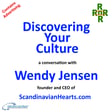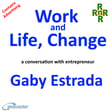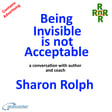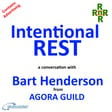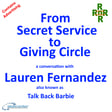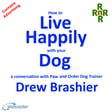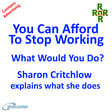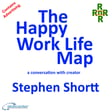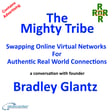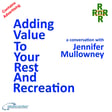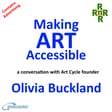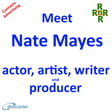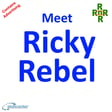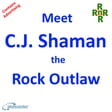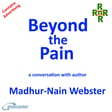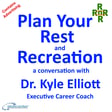
Being Creative – a conversation with the Fairy Godmother of Creativity
For every aspect of the way any and every organisation large or small operates there is a system. A way of doing things properly so that standards can be maintained, objectives achieved, and customers satisfied.
They are the result of lots of big brains and spending big budgets on lots of research and testing.
So, what would happen if you transferred those systems out of the world of work and implemented them in your wider life?
That is what Tricia Duffy, who was a management consultant did. Now Tricia who created the In Ten Years Time Philosophy is widely known as the godmother of creativity.
In this episode of the Abecederwork life balance podcast Rest and Recreation Tricia explains her journey from management consulting to living a creative life, to host Michael Millward.
Tricia explains the ups and downs of the change process, what got left behind and how life has changed for the good.
Tricia also hosts the In Ten Years Time podcast, which is available wherever you pod.
Rest and Recreation is Made on Zencastr, because creating on Zencastr is so easy.
If you would like to try podcasting using Zencastr use our offer code ABECEDER.
Travel
Tricia is based in London. Members of The Ultimate Travel Club travel at trade prices. Use our offer code ABEC79 to receive a discount on club membership.
Visit Abeceder for more information about Michael Millward, and Tricia Duffy.
Proactive Positive Ageing.
It is always a good idea to know the risks early so that you can take appropriate actions to maintain good health, that is why we recommend The Annual Health Test from York Test.
York Test provides an Annual Health Test. An experienced phlebotomist will complete a full blood draw at your home or workplace. Hospital standard tests covering 39 different health markers are carried out in a UKAS-accredited and CQC-compliant laboratory.
A Personal Wellness Hub gives access your easy-to-understand results and guidance to help you make effective lifestyle changes anytime via your secure, personal Wellness Hub account.
Visit York Test and use this discount code ABECEDER2.
Being a Guest
If you would like to be a guest on Rest and Recreation, please contact Abeceder.
We recommend that potential guests take one of the podcasting guest training programmes available from Work Place Learning Centre.
If you have liked this episode of Rest and Recreation, please give it a like and download it. To make sure you do not miss future editions please subscribe.
Remember, the aim of all the podcasts produced by Abeceder is not to tell you what to think, but we do hope to make you think!
Thank you to you for listening.
Tech Problems?
If you are using your smartphone to listen to The Independent Minds and experienced connection problems, you would probably like to know that Three has the UK’s fastest 5G network with unlimited data, so listening on Three means that you can wave goodbye to buffering.
Visit Threefor information about business and personal telecom solutions from Three, and the special offers available when you quote our referral code WPFNUQHU
